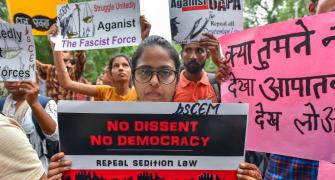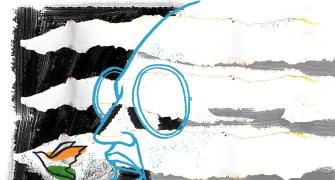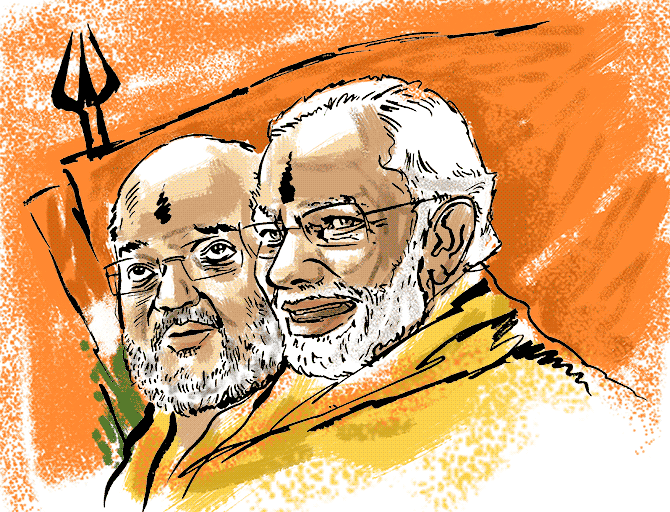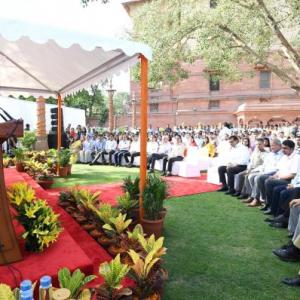The term, 'pro-Pakistani', is helpful for the BJP to depict its opponents as anti-nationals while the sedition law is handy for locking up or harassing the government's critics, points out Amulya Ganguli.
Illustration: Uttam Ghosh/Rediff.com
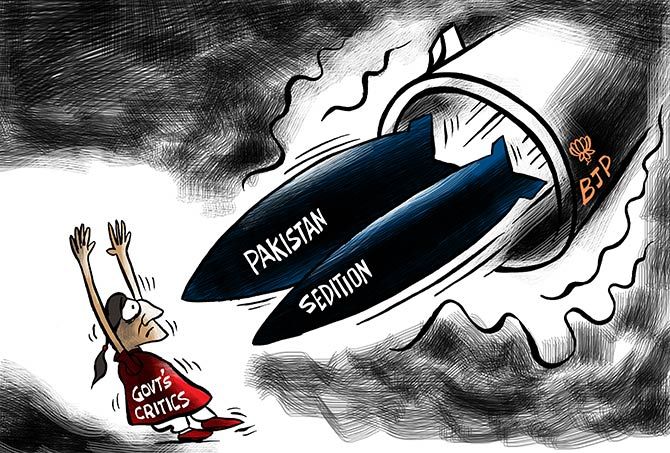
Pakistan and sedition are the two Brahmastras (ultimate weapons) in the BJP's political armoury.
The party almost always uses these two missiles in its battles with the Opposition and, not surprisingly, comes out on top.
Both are foolproof.
Once fired, they not only do not miss the target, they also make it extremely difficult for those at the receiving end to undo the damage which the warheads cause.
For instance, the term, pro-Pakistani, is helpful for the BJP for depicting its opponents as anti-nationals whenever the latter say anything which the saffron camp does not like while the colonial-era sedition law is handy for locking up or at least harassing the government's critics.
It is difficult to envisage what would have been the BJP's tactics if Pakistan was, say, a 'normal' country which did not use terror as an instrument of State policy, or if a government had done away with the sedition law in the years immediately after Independence because of its British association.
What would have been the BJP's mode of attack on the Opposition in such unpropiitious circumstances?
In Pakistan's place, it could have continued lambasting the Opposition, and especially the Congress, of Muslim appeasement.
But such a stance would have been tricky in view of the BJP's post-2014 sabka saath, sabka vikas mantra, which presumably includes the Muslims.
The Muslim appeasement charge was useful for the BJP when it was in the Opposition as it did not need at the time to woo the minorities.
But, now that it is in power, it has to, at least for form's sake, claim that it makes no distinctions between the different communities and even wants the 'trust' (sabka vishwas) of those who may have reservations about the party.
However, an authoritarian party needs an identifiable enemy to buttress its propaganda.
Hitler railed against the 'November criminals' in Germany who signed the armistice in 1918.
The target of Communists in the former Soviet Union was the bourgeoisie.
To the radical Islamists, it is the infidels.
In the US and Europe today, the entry of immigrants, whether brown, black or even white, is used by the far right for ratcheting up patriotic fervour.
Hungary's Prime Minister Viktor Orban favours an 'illiberal democracy' to achieve his hyper-nationalist objective while the American president is building a wall to keep out the 'huddled masses', noted by the Statue of Liberty in the New York harbour.
Is India passing through such a phase?
If the social media and some of the television channels are a guide, a pronounced pro-government tilt which does not hesitate to describe the Opposition as treacherous is discernible.
In an atmosphere where treason is suspected to be stalking the land with distinguished members of the intelligentsia evoking the ire of a magistrate for writing a letter to the prime minister and students being expelled by a vice-chancellor for the same 'offence', it is hardly surprising that Rajnath Singh called for a further strengthening of the sedition law when he was the home minister.
According to him, the firming up of the law would have to be to such that even the 'soul' of the anti-nationals would shiver.
What was being envisaged -- public hanging or showing the accused the instruments of torture as was done to Galileo and others in medieval Europe?
Clearly, the government has no time for the views of a Supreme Court judge that the law had to be toned down if not abolished altogether.
It is not the BJP alone which has a special liking for the law.
The Congress, too, has done little more than pay lip service to the need for dispensing with it.
The party of Mahatma Gandhi and Jawaharlal Nehru had ample time during the decades when it was in power to scrap it.
But it did nothing of the sort.
The reason for the dithering of the ruling parties of all hues in the matter of abolishing the draconian legislation is its usefulness in silencing criticism.
However, since it is not easy for the government to secure the conviction of the assorted 'anti-nationals' on the grounds of inciting violence, the law is used mainly to harass them even though, as the Supreme Court judge, Deepak Gupta, has said, the rate of conviction in such cases is very low.
It is not known if a stiffening of the law will raise the rate of conviction, but there is little doubt that the law, which was drafted by Lord Macaulay in 1837 and inserted in the Indian Penal Code in 1870, is here to stay.
Only a broadminded government of upright individuals will be bold enough to break away from a stifling, cynical past to follow the dictates of morality to abolish the law.
Given the calibre of the people who enter the legislatures today -- nearly 50% of the MPs have a dubious record -- the chances of the law being re-examined for being too harsh are limited.
Amulya Ganguli is a writer on current affairs.

